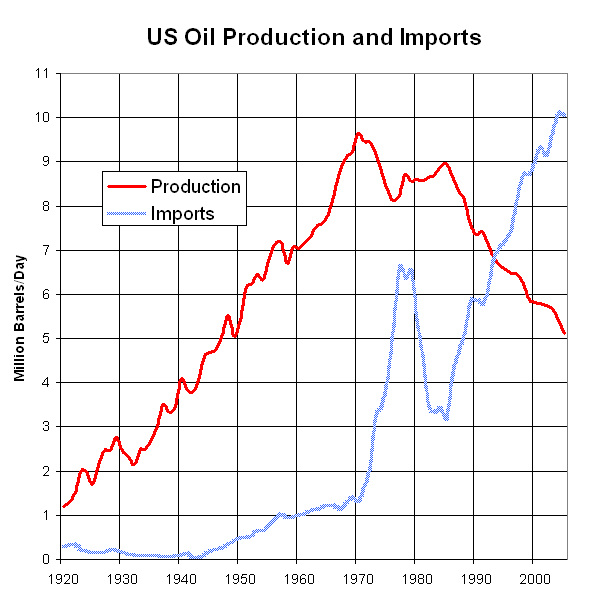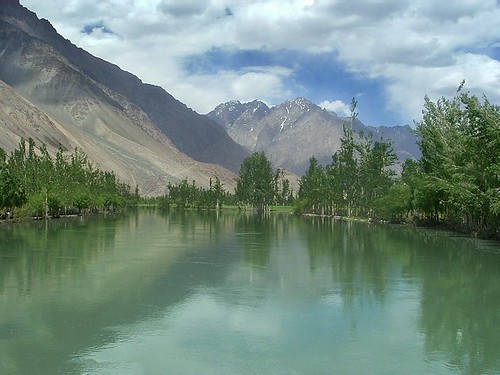The American way of life --" which is now virtually synonymous with suburbia --" can run only on reliable supplies of dependably cheap oil and gas. Even mild to moderate deviations in either price or supply will crush our economy and make the logistics of daily life impossible. --" Jim Kunstler --" The Long Emergency
Here we stand
Like an Adam and an Eve
Waterfalls
The Garden of Eden
So beautiful and strong
The birds in the trees
Are smiling upon them
From the age of the dinosaurs
Cars have run on gasoline
Where, where have they gone?
Now, it's nothing but flowers
Talking Heads --" Nothing but Flowers
America was a Garden of Eden with nothing but flowers, trees and vegetation. We bit into the forbidden fruit of oil over a century ago. It has been a deal with the Devil. Oil brought immense wealth, rapid industrialization, 2.7 million miles of paved roads, and enormous power to America. But, now the SUV is running on empty. In the not too distant future the downside of the deal with the Devil will reveal itself. America was the land of the free and home of the brave. Now it is the land of the Range Rover and home of the BMW. In a few years it could be the land of the forlorn and home of the broken down. Our entire society has been built upon a foundation of cheap oil. The discovery of oil in Titusville, PA in 1859 turbo charged the Industrial Revolution in the U.S. The development of our sprawling suburban culture was dependent upon cheap oil. Americans could not survive for a week without oil. Commerce in the U.S. depends upon long haul truckers. Food is transported thousands of miles to grocery stores. The cheap Wal-Mart crap is transported thousands of miles across the seas from China. Americans believe it is our God given right to cheap oil. We are the chosen people. Kevin Phillips, in his brilliant book American Theocracy describes our love affair with cheap oil:
Americans constitute the world's most intensive motoring culture. For reasons of history and past abundance, no other national population has clumped so complacently around so fuelish a lifestyle. For many citizens the century of oil has brought surfeit: gas-guzzling mobile fortresses, family excursions on twenty thousand-thousand-gallons-per-hour jet aircraft, and lavishly lit McMansions in glittering, mall packed exurbs along outer beltways. Against a backdrop of declining national oil and gas output, Americans consume 25% of world energy while holding just 5% of its energy resources. As the new century began, Americans enjoyed a lifestyle roughly twice as energy intensive as those in Europe and Japan, some ten times the global average. Of the world's 520 million automobiles, unsurprisingly, more than 200 million were driven in the United States, and the U.S. car population was increasing at five times the rate of the human population. How long that could continue was not clear.
John and Jane Q. Citizen mostly ignore these trends and details, and know nothing of geologist Hubbert's bell-shaped charts of peak oil. Senior oil executives sometimes discuss them in industry conferences, but elected officials --" many with decades of energy platitudes under their belts --" typically shrink from opening what would be a Pandora's Box of political consequences. Oil was there for our grandfathers, they insist, and it will be there for our grandchildren; it is part of the American way.
Ignoring the facts and pretending that we can count on cheap oil for eternity is delusional. It is also the American way. The age of oil is coming to an end.
There are consequences to every action. There are also consequences to every inaction. Over the next decade Americans will experience the dire consequences of inaction. The implications of peak cheap oil have been apparent for decades. The Department of Energy was created in 1977. The Department of Energy's overarching mission was to advance the national, economic, and energy security of the United States. In 1970, the U.S. imported only 24% of its oil. There were 108 million motor vehicles in the U.S., or .53 vehicles per person in the U.S. Today, the U.S. imports 70% of its oil and there are 260 million vehicles, or .84 vehicles per person. Jim Kunstler describes our bleak future in The Long Emergency:
"American people are sleepwalking into a future of hardship and turbulence. The Long Emergency will change everything. Globalism will wither. Life will become profoundly and intensely local. The consumer economy will be a strange memory. Suburbia --" considered a birthright and a reality by millions of Americans --" will become untenable. We will struggle to feed ourselves. We may exhaust and bankrupt ourselves in the effort to prop up the unsustainable. And finally, the United States may not hold together as a nation. We are entering an uncharted territory of history."
The land of the delusional has no inkling that their lives of happy motoring are winding down. The vast majority of Americans believe that oil is abundant and limitless. Their leaders have lied to them. They will be completely blindsided by the coming age of hardship.
Factories & Shopping Malls
(Note: You can view every article as one long page if you sign up as an Advocate Member, or higher).
|
Rate It | View Ratings |

OpEdNews depends upon can't survive without your help.
If you value this article and the work of OpEdNews, please either Donate or Purchase a premium membership.
If you've enjoyed this, sign up for our daily or weekly newsletter to get lots of great progressive content.
To View Comments or Join the Conversation:












